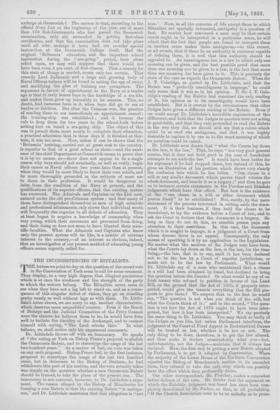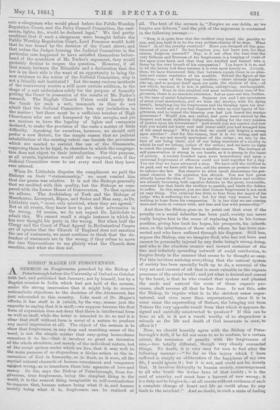THE INCONSISTENCIES OF RITUALISTS.
THE letters we print to-day on the question of the recent vote in the Convocation of York seem to call for some comment. They display, in a very high degree, that illogical persistence which is at once the weakness and the strength of the party to which the writers belong. The Ritualists never seem to see when they have not a leg left to stand on, and as a conse- quence of this singular defect of vision, they go on standing pretty nearly as well without legs as with them. Dr. Little- dale's letter shows, we are sorry to say, another characteristic, which deserves more unqualified-censure. Even if the Bench of Bishops and the Judicial Committee of the Privy Council were the sinners he believes them to be, he would have done well to imitate the timidity of the Archangel, and to content himself with saying, " The Lord rebuke thee." In what follows, we shall notice only his unpersonal comments.
Dr. Littledale throws off with an inaccuracy. He speaks of " the voting at York on Bishop Fraser's proposal to abolish the Ornaments Rubric, and to stereotype the usage of the last two hundred years." As a matter of fact, no vote was taken on any such proposal. Bishop Fraser had, in the first instance, proposed to stereotype the usage of the last two hundred years, but in deference to the Bishop of Durham, he had withdrawn this part of his motion, and the vote actually taken was simply on the question whether a new Ornaments Rubric should be framed, to take the place of the present one. The inaccuracy is not material, however, to Dr. Littledalo's argu- ment. The reason alleged by the Bishop of Manchester for framing a new Rubric is that the existing Rubric "is ambigu- ous," and Dr. Littledale maintains that this allegation is "not
true." Now, in all the concerns of life except those in which Ritualists are specially interested, ambiguity is a question of fact. No matter how convinced a man may be that certain words ought to be interpreted in a particular sense, he will admit that the fact that people are found to interpret them in another sense makes them ambiguous to this extent, at all events, that if there be an authority in existence capable of defining them, it is well that this authority should be appealed to. An unambiguous law is a law to which only one meaning can be given, and the best possible proof that more than one meaning con be given to a law, is the fact that more than one meaning has been given to it. This is precisely the state of the case as regards the Ornaments Rubric. When Sir J. T. Coleridge, as quoted by Dr. Littledale, said that the Rubric was " perfectly unambiguous in language," he could only mean that it was so in his opinion. If Sir J. T. Cole- ridge's reading of the Rubric had remained the only reading of it, his opinion as to its unambiguity would have been established. But it is overset by the circumstance that other Judges have given a different reading of the Rubric. Even if we could accept Dr. Littledale's incredible explanation of this difference, and hold that the Judges in question were not acting in good-faith, and that they only pretended to read the Rubric in the way they did, we should still say that a rubric which could be so read was ambiguous, and that it was highly desirable to replace it by one as to the exact meaning of which no question could be raised.
Dr. Littledale next denies that " what the Courts lay down as the law, is the law." That, he says, " is a very good general maxim, but it does not hold good in the case of fraudulent attempts to set aside the law." It would have been better for his argument if he had stopped there, but instead of this, he gives an illustration of his position which shows very clearly the confusion into which he has fallen. " One clause in a will or any similar document which proves fraud vitiates the whole document, and brands it as a forgery ;" and then he goes on to instance certain statements in the Purchas and Ridedale judgments which have this effect. But how is the existence of the " one clause in a will or other document which proves fraud " to be established ? Not, surely, by the mere statement of the persons interested in setting aside the docu- ment. It is their business, if they hold the clause to be fraudulent, to lay the evidence before a Court of law, and to ask the Court to declare that the document is a forgery. So long as they do not do this, no sensible person pays any attention to their assertions. In this case, the document which it is sought to impugn, is a judgment of a Court from whose decrees there is no appeal. Consequently, the only means of upsetting it is by an application to the Legislature. No matter what the motives of the Judges may have been, what the Courts lay down as the law, is the law, for the time being,—the law, that is to say, until it has been declared not to be the law by a Court of superior jurisdiction, or made not to be the law by Parliament. What would Dr. Littledale say of a man who maintained that a clause in a will had been obtained by fraud, but declined to bring the question before the Courts ? Or what would he say of an Irish tenant who refused to petition in favour of the Land Bill, on the ground that the Act of 1870, if properly inter- preted, would give the tenants everything that the Bill pro- poses to give them ? We suspect that to the first he would say, " The question is not what you think of the will, but what the Courts think of it ;" and to the second, " The ques- tion is not how the Act of 1870 ought to have been inter- preted, but how it has been interpreted." We say precisely the same thing to Dr. Littledale. You may think as badly of the Judges as you like, but unless Parliament interferes, the judgment of the Court of Final Appeal in Ecclesiastical Causes will be treated as law, whether it be law or not. The only thing to be done, therefore, is to get the law altered, and thus make it declare unmistakably what you—but,
unfortunately, not the Judges—maintain that it always has declared. Now, the first step to getting a new Rubric adopted by Parliament, is to get it adopted by Convocation. When the majority of the Lower House of the Northern Convocation rejected the Bishop of Manchester's motion in its amended form, they refused to take the only step which can possibly have the effect which they professedly desire.
Our other correspondent, Mr. Fletcher, makes a somewhat better defence of the vote. He thinks that the argument on which the Ridsdalo judgment was based has since been com- pletely demolished by Mr. Parker, so that, in all probability, "If the Church Association were to be so unlucky as to prose-
cute a clergyman who would plead before the Public Worship Regulation Court, and the Privy Council Committee, the vest- ments, lights, &c., would be declared legal." We feel pretty confident that if such a clergyman were brought before the Public Worship Regulation Court, Lord Penzance would hold that he was bound by the decision of the Court above, and that unless the Judges forming the Judicial Committee in the particular case happened to have satisfied themselves before- hand of the soundness of Mr. Parker's argument, they would probably decline to reopen the question. However, if all that stands between the Ritualists and a declaration that the law is on their side is the want of an opportunity to bring the new evidence to the notice of the Judicial Committee, why is not a friendly suit instituted ? Let the many curious incidents of the controversy receive a still more curious addition, in the shape of a suit undertaken solely for the purpose of formally putting the Court in possession of the results of Mr. Parker's research. The English Church Union could hardly find the funds for such a suit, inasmuch as they do not admit that the Judicial Committee has any jurisdiction in the matter ; but there must be a sufficient number of High Churchmen who are not hampered by this scruple, and yet are anxious to have the legality of lights and vestments declared, to make the provision of the costs a matter of little difficulty. Speaking for ourselves, however, we should still prefer a new Rubric, for the simple reason that no judicial rehabilitation of the existing rubric can furnish the provisions which are needed to restrict the use of the Ornaments, supposing them to be legal, to churches in which the congrega- tion does not object to their introduction. For this purpose, at all events, legislation would still be required, even if the Judicial Committee were to eat every word that they have ever uttered.
When Dr. Littledale disputes the compliment we paid the Bishops on their "statesmanship," we must remind him that our praise was relative. It is not the Bishops generally that we credited with this quality, but the Bishops as com- pared with the Lower House of Convocation. To that opinion we adhere. The Archbishop of York and the Bishops of Manchester, Liverpool, Ripon, and Sodor and Man may, as Dr. Littledale says, " mean only mischief, when they are agreed." But at all events, they know how to put their adversaries in the wrong. Of course, we do not expect Dr. Littledalo to admit this. We cannot recall a single instance in which he has ever thought his party in the wrong. But when half the Clergy and the Court of Final Appeal in.Ecclesiastical Causes are of opinion that the Church of England does not sanction the use of vestments, we must continue to think that the de- fenders of vestments are in the wrong, if they refuse to move the two Convocations to say plainly what the Church does sanction, and what she does not.







































 Previous page
Previous page